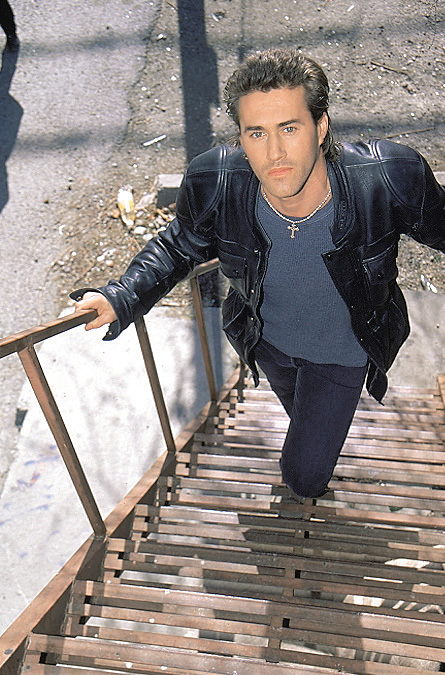
Please write: dan@dancooper.tv
Return to Page One
Register here!
 |
|
|
FF: Right ...
Roy Dupuis: ... my history teacher gave me ninety-six because of the play. And my French teacher the same thing. But I didn’t have what it takes to keep studying in science. Because I hadn’t done my physics class. So I started studying psychology, and during the time we were doing Le Malade Imaginaire, I met this girl who was doing Toinette, and she had decided she wanted to be an actress. She was going to present her auditions to the National Theatre School of Canada, which I didn’t know existed.
And so about six months later she called me and says she’s preparing her auditions, and she asked me if I would do lines for her. So I said yes, and then we rehearsed, and two days before her audition, which was on my birthday, the twenty-first of April, she comes to my birthday and gives me as a present the questionnaire the National Theatre School sends you when you subscribe to the auditions.
And it was the questionnaire of a friend of hers who had registered for the auditions, but didn’t want to go any more.
FF: I see.
Roy Dupuis: And she said you can make believe you’re him if you want.
FF: It’s almost like a Molière play.
Roy Dupuis: And I said, why not. Because I was in high school taking psychology. I didn’t know what I wanted to do really.
FF: Right.
Roy Dupuis: And I said why not. And so I went to the auditions with her. We said we were going to do our auditions together. And another lucky thing was that the guy who didn’t go to the audition had the same date and same hour that she had. So they said okay, so my name was Stefan Labelle, and I was presenting my audition with her.
So we did our scenes. One of the scenes was from Le Malade Imaginaire, and another one was by a Quebec playwright. And after that we went to the desk to discuss with the people who watched you do the auditions, and another stroke of luck was that the director of the National Theatre School and another person were there -- because there’s many teams that see actors come in.
FF: Right.
Roy Dupuis: So there’s about six groups, because there’s about two thousand auditions every year for that school, so luckily, it was a director who was actually a directress. She was a woman. And so we sat down after we’d done our scene. Now she’s looking at me and looking at the table and looking at me at a certain point. She’s not saying anything, and she says, pointing at the table, she says that’s not you. I said "What?" And she shows me the picture of Stefan Labelle that we had forgotten that ...
FF: Oops ...
Roy Dupuis: When you apply, you send your picture.
FF: Right.
Roy Dupuis: The guy was like Afro-haired, black, and it was a graduation picture, you know. So I just started laughing. And then Michelle, the girl I went to the auditions with, was laughing and everybody was laughing. And she started asking me some questions. Why didn’t you register? And she’s starting to say you know that’s illegal. You cannot make believe you’re someone else in life.
And I said yeah, that’s okay. But anyway I was there for Michelle.
FF: Right.
Roy Dupuis: And I said yeah, yeah. Forget about
me. And she kept on asking questions. And do you like theater and do you like acting and
stuff like that. And at the end she just said well, here’s a registration form. Fill
that out. Put your picture on it, and come bring it back to me, and if you’re ever
accepted in the school don’t say anything to anybody. So that’s how it started.
 |
FF: Oh, very interesting. And any particular teachers that you recall that were especially inspiring in this next stage?
Roy Dupuis: Almost all of them. You see, in National Theatre School, you study there for four years. And you work with six professional directors every year...
FF: Wow
Roy Dupuis: ... which is actually -- each one of them is a school.
FF: Sure.
Roy Dupuis: So each and every one of them gave us their world there. A way of working which is very good, because actually that’s what we do when we get out. We work with different schools, different ways of ...
FF: ... doing things. And so the technique of each of these individuals varied.
Roy Dupuis: ... and at the same time we’re studying quite different styles too. Like from Brecht to Racine, to ...
FF: Wow, that’s quite an impressive training ground.
Roy Dupuis: … to Sam Shepherd. Yeah.
FF: And was there any particular technique that you found that you just naturally gravitated to, of any one particular instructor or director?
Roy Dupuis: No. I think I’ve – well, Stanislavsky is the base, and then Grotowski has some other stuff that you can use. Depending on what you’re doing. And you know ...
FF: Yes ...
Roy Dupuis: ... the more tools you have.
FF: Exactly.
Roy Dupuis: So, depending on the characters you’re playing, or the style of movie, or the style of the play you’re doing, any of the tools might be useful.
FF: Right. And are there any special student improvisations or productions that stand out in memory as key to your development during that time?
Roy Dupuis: No, you see actually another thing at the National Theatre School of Canada, you get in and you’re sixteen -- eight boys, eight girls. And you go four years with the same group.
FF: Wow. That’s pretty intense.
Roy Dupuis: It kind of becomes another family.
FF: Sure.
Roy Dupuis: So each and every one of them, yeah, were very important for me.
FF: And so that’s sixteen students out of two thousand applicants.
Roy Dupuis: Yeah.
FF: Wow. That’s fairly competitive.
Roy Dupuis: Yeah it is. I didn’t know that.
FF: Right.
Roy Dupuis: I knew that once I was in.
